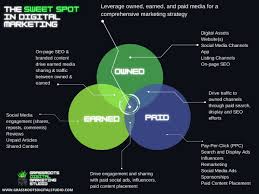The Importance of Keyword Research in Digital Marketing
In the world of digital marketing, keyword research plays a crucial role in the success of any online campaign. Keywords are the foundation of search engine optimization (SEO) and pay-per-click (PPC) advertising strategies, helping businesses connect with their target audience and drive relevant traffic to their websites.
Keyword research involves identifying the specific words and phrases that users type into search engines when looking for information, products, or services related to a particular industry or topic. By understanding these keywords, businesses can tailor their content to match user intent and improve their visibility in search engine results pages.
Benefits of Keyword Research
- Improved SEO: By incorporating relevant keywords into website content, meta tags, and URLs, businesses can improve their search engine rankings and attract more organic traffic.
- Targeted Advertising: In PPC campaigns, choosing the right keywords can help businesses reach a specific audience interested in their products or services, leading to higher conversion rates.
- Content Strategy: Keyword research guides content creation by providing insights into what topics are popular among users. This helps businesses create valuable and engaging content that resonates with their target audience.
- Competitor Analysis: Monitoring competitors’ keyword strategies can reveal valuable insights and help businesses identify new opportunities for growth.
How to Conduct Keyword Research
There are several tools available to help businesses conduct keyword research effectively. Popular options include Google Keyword Planner, SEMrush, Ahrefs, and Moz Keyword Explorer. These tools provide valuable data on search volume, competition level, and keyword variations, enabling businesses to make informed decisions about which keywords to target.
When conducting keyword research, it’s essential to consider factors such as relevance, search volume, competition level, and user intent. By selecting the right keywords for their digital marketing campaigns, businesses can increase their online visibility, attract qualified leads, and ultimately achieve their marketing goals.
In conclusion, keyword research is a fundamental aspect of digital marketing that can significantly impact the success of online campaigns. By investing time and resources into identifying the most relevant keywords for their target audience, businesses can enhance their SEO efforts, drive targeted traffic to their websites, and ultimately achieve greater online visibility and success.
Mastering Keyword Research: 8 Essential Tips for Effective SEO Strategy
- Understand your target audience and their search behaviour
- Use keyword research tools to discover relevant keywords
- Focus on long-tail keywords for more specific targeting
- Analyse competitor keywords to identify opportunities
- Consider search intent when selecting keywords
- Regularly update and expand your list of targeted keywords
- Optimise website content with chosen keywords for SEO
- Track keyword performance and adjust strategies accordingly
Understand your target audience and their search behaviour
Understanding your target audience and their search behaviour is a critical aspect of effective keyword research. By gaining insights into the specific words and phrases your audience uses when searching for products or services online, you can tailor your keyword strategy to match their intent. This approach not only improves the relevance of your content but also increases the likelihood of attracting qualified leads to your website. By aligning your keywords with your target audience’s search behaviour, you can enhance the overall effectiveness of your digital marketing efforts and drive meaningful engagement with potential customers.
Use keyword research tools to discover relevant keywords
Utilising keyword research tools is a valuable strategy to uncover relevant keywords for your digital marketing campaigns. These tools provide insights into search volume, competition levels, and keyword variations, allowing you to identify the most effective keywords to target. By leveraging keyword research tools, businesses can enhance their SEO efforts, attract targeted traffic, and align their content with user intent. This proactive approach not only improves online visibility but also increases the likelihood of reaching and engaging with the right audience for optimal results.
Focus on long-tail keywords for more specific targeting
When conducting keyword research, it is beneficial to focus on long-tail keywords for more specific targeting. Long-tail keywords are longer and more specific phrases that users are likely to search for when they have a clear intent in mind. By targeting long-tail keywords, businesses can reach a more niche audience that is actively seeking their products or services. This approach not only helps improve the relevance of content but also increases the chances of attracting qualified leads and driving higher conversion rates. In essence, prioritising long-tail keywords in your digital marketing strategy can lead to more precise targeting and better results in reaching your desired audience.
Analyse competitor keywords to identify opportunities
Analysing competitor keywords to identify opportunities is a valuable tip in keyword research. By studying the keywords that competitors are targeting in their digital marketing strategies, businesses can gain insights into gaps in the market and areas where they can differentiate themselves. This analysis can reveal untapped keyword opportunities that competitors may have overlooked, allowing businesses to tailor their own keyword strategies for maximum impact and competitiveness in the online landscape.
Consider search intent when selecting keywords
When conducting keyword research, it is essential to consider search intent when selecting keywords. Understanding the intent behind a user’s search query is crucial in identifying the most relevant keywords for your digital marketing campaigns. By aligning your chosen keywords with the search intent of your target audience, you can ensure that your content meets their needs and provides valuable information or solutions. This strategic approach not only improves the effectiveness of your SEO efforts but also enhances user experience, leading to higher engagement and conversion rates on your website.
Regularly update and expand your list of targeted keywords
Regularly updating and expanding your list of targeted keywords is a crucial tip in effective keyword research. As search trends and user behaviour evolve, it’s essential to stay ahead by continuously refining your keyword strategy. By adding new relevant keywords and removing underperforming ones, you can ensure that your content remains optimised for search engines and resonates with your target audience. This proactive approach not only helps improve your website’s visibility but also enhances the overall effectiveness of your digital marketing efforts.
Optimise website content with chosen keywords for SEO
To enhance the effectiveness of your SEO strategy, it is crucial to optimise your website content with carefully chosen keywords. By strategically incorporating relevant keywords into your website content, meta tags, and URLs, you can improve your search engine rankings and attract more organic traffic. This practice not only signals search engines about the relevance of your content to users’ search queries but also helps users easily find the information they are looking for. Ensuring that your website content aligns with your chosen keywords can significantly boost your online visibility and drive targeted traffic to your site.
Track keyword performance and adjust strategies accordingly
Tracking keyword performance is a crucial aspect of effective keyword research in digital marketing. By monitoring how well specific keywords are performing in terms of search volume, click-through rates, and conversion rates, businesses can gain valuable insights into the effectiveness of their SEO and PPC strategies. By analysing this data regularly, businesses can identify underperforming keywords and adjust their strategies accordingly. This proactive approach allows businesses to focus their efforts on high-performing keywords that drive relevant traffic and conversions, ultimately maximising the impact of their digital marketing campaigns.



